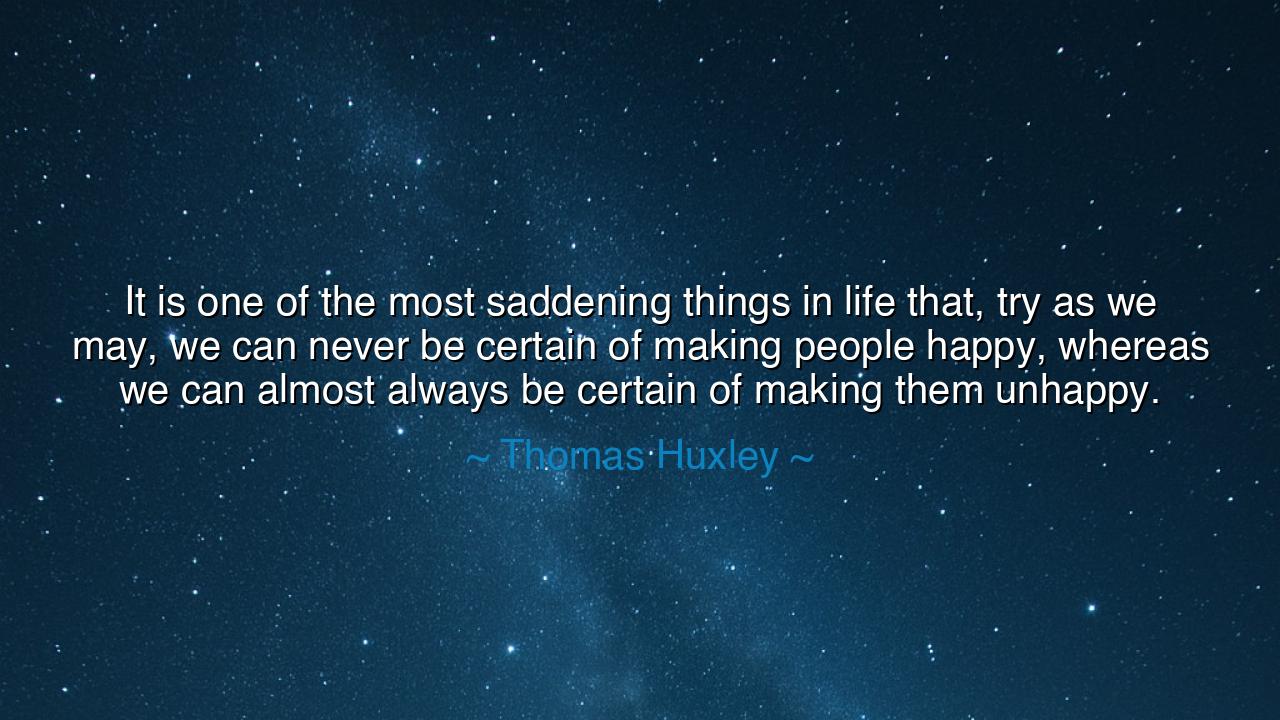
It is one of the most saddening things in life that, try as we
It is one of the most saddening things in life that, try as we may, we can never be certain of making people happy, whereas we can almost always be certain of making them unhappy.






“It is one of the most saddening things in life that, try as we may, we can never be certain of making people happy, whereas we can almost always be certain of making them unhappy.” — so wrote Thomas Huxley, the English biologist, philosopher, and defender of Darwin’s truth. Though born in the age of science, Huxley’s words ring with the melancholy of a poet and the wisdom of a sage. In this single reflection, he reveals one of life’s oldest sorrows — that the human heart is far easier to wound than to heal, and that good intentions, however pure, often stumble before the mysterious complexity of another’s soul.
To the ancients, this truth was already known. They spoke of the fragility of joy and the burden of speech. The Greek tragedians taught that happiness is a fleeting guest, light as a leaf and easily driven away by the smallest wind of misunderstanding. Yet sorrow, like stone, endures. A careless word, a forgotten kindness, a moment of neglect — these are enough to bruise the tender spirit. But to bring happiness — ah, that is a task as delicate as shaping glass in flame. Huxley’s lament is not bitterness, but compassion; he mourns the tragic imbalance between our desire to give joy and our power to inflict pain.
In his time, Huxley was known as “Darwin’s bulldog,” a fierce defender of evolution and reason in an age of doubt. Yet behind that iron mind lived a soul acquainted with tenderness. He had seen how easily people misunderstood one another — how even truth, spoken without gentleness, can wound. Like Prometheus bringing fire, he knew that enlightenment often scorches before it warms. His insight arose not only from study, but from life: the realization that the pursuit of good often harms, and that even love, without care, may cause grief. To wish happiness for another is noble; to achieve it is near divine.
History offers us countless mirrors of this truth. Consider King Lear, who gave his kingdom to his daughters out of love, believing that by dividing his wealth he would secure their joy. But in his attempt to please, he destroyed them — and himself. His intentions were pure; his actions, tragic. So it is with us all: the heart that seeks to comfort may wound, the tongue that means to soothe may pierce. Huxley’s words remind us that human connection is fragile, and that kindness demands not only feeling, but wisdom.
Yet the quote also carries a deeper, more humbling lesson — that happiness cannot be imposed. The joy of others lies beyond our dominion, born from their own hearts, their own battles, their own readiness to receive it. We may offer laughter, love, and light, but we cannot plant joy in soil that is not yet willing to grow it. This realization, though painful, frees us from the arrogance of control. It teaches us to love gently — to give without expectation, to serve without claiming mastery over another’s peace.
And still, there is no despair here. For if we cannot ensure happiness, we can choose not to cause sorrow. We can speak softly, forgive quickly, and walk with awareness of how sharp our smallest actions may be. The wise learn to temper their impulses with empathy, to pause before words, to understand before they judge. This, perhaps, is what Huxley longed for — a humanity conscious of its power to wound, and careful in its use of that power.
So, my child, remember this truth as you walk among others: joy is fragile, and sorrow is swift. Do not seek to control the happiness of those you love — rather, nurture the soil where it might grow. Offer kindness, but let it breathe; give affection, but without chains. And above all, strive to do no harm. For though we may never master the art of making others happy, we can master the discipline of not adding to their sorrow. And in that restraint — in that quiet compassion — we may find the gentlest, truest form of love that mortal hearts can give.






AAdministratorAdministrator
Welcome, honored guests. Please leave a comment, we will respond soon